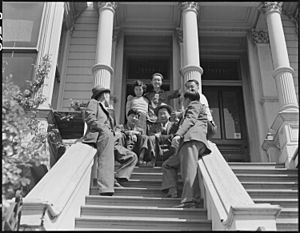Mike Masaoka facts for kids
Quick facts for kids
Mike Masaoka
|
|
|---|---|

Masaoka (second from left), national secretary and field executive for the Japanese American Citizens League, with friends in San Francisco (April 1942)
|
|
| Born | October 15, 1915 Fresno, California, U.S.
|
| Died | June 26, 1991 (aged 75) |
| Education | University of Utah |
Mike Masaru Masaoka (October 15, 1915 – June 26, 1991) was an important Japanese-American leader. He worked as a lobbyist, writer, and public speaker. For over 30 years, he was a key figure in the Japanese American Citizens League (JACL).
During World War II, Masaoka encouraged Japanese Americans to cooperate with the government's Japanese American internment policy. However, he also strongly fought for the rights of Japanese Americans during and after the war.
Contents
Growing Up
Masaoka was born in Fresno, California. His family later moved to Salt Lake City, Utah. There, he officially changed his first name to "Mike." He also became a member of The Church of Jesus Christ of Latter-day Saints.
Mike Masaoka was a very good debater. He graduated from the University of Utah in 1937. He studied economics and political science.
Leading the Japanese American Citizens League
When he was 25, Masaoka became the National Secretary and Field Executive of the Japanese American Citizens League (JACL). This was just before World War II began. The JACL was an organization for Japanese Americans living on the mainland United States.
Masaoka played a big role in the JACL's decision to cooperate with the Japanese American internment. This was when the U.S. government forced Japanese Americans into special camps during the war. Masaoka believed that fighting against this policy would make things worse. He thought it would increase problems between Japanese Americans and the government.
As a national spokesperson, he encouraged people to cooperate. He also advised the government on how to manage the camps. This was to help reduce problems between those in the camps and their guards. Masaoka himself was never held in a camp.
Masaoka also helped lead the effort to form a military unit made up of Japanese Americans. Many men from Hawaii joined the U.S. 100th Infantry Battalion. Later, many more joined the 442nd Regimental Combat Team. Masaoka worked to publicize the brave actions of these units. He wanted everyone to know about the sacrifices Japanese American soldiers made.
Later in his life, Masaoka hinted that the government had pressured him. They wanted him to make certain statements and suggestions. He said it was like a "shibai" (a Japanese word for a performance or show). He meant they were in a very difficult situation.
After the War
In 1951, Masaoka was a consultant for the movie Go For Broke!. This film showed the heroic actions of the 442nd Regiment and 100th Battalion. Some veterans from the 442nd even starred in the movie.
In 1950, Masaoka helped lobby for the rights of Issei. These were Japanese immigrants who were not allowed to become U.S. citizens before. His efforts helped them gain the right to naturalize as citizens. In 1952, he worked on a court case that helped overturn a law preventing Japanese Americans from owning land in California.
He also represented the JACL as a founding member of the Leadership Council on Civil Rights. He joined Dr. Martin Luther King Jr.'s March on Washington in 1963. Masaoka also had his own consulting firm. He worked as a lobbyist for American and Japanese businesses.
In 1987, his autobiography was published. It was called They Call Me Moses Masaoka. The title was a nickname given to him by opponents in the 1940s. Masaoka joked that unlike Moses, he led his people from California to desert internment camps.
Family and Later Years
Mike Masaoka was married to Etsu Mineta Masaoka. She was the older sister of Norman Mineta, who later became a U.S. Congressman and Secretary of Transportation. Mike Masaoka passed away in Washington, D.C., in 1991.
 | Delilah Pierce |
 | Gordon Parks |
 | Augusta Savage |
 | Charles Ethan Porter |

